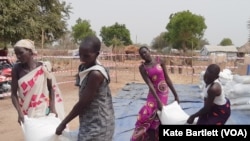South Sudan is in dire need of humanitarian aid. The country is facing unprecedented levels of food insecurity, with some areas of the country in danger of tipping into famine. This is a complex situation caused by a number of factors, including sporadic violence; four years of above average rainfall that caused the worst flooding in decades, washing away fields, killing livestock and displacing hundreds of thousands of people; a shortage of food available for export as a result of Russia’s war on Ukraine; and the lingering effects of the COVID-19 pandemic.
According to the Famine Early Warning Systems Network, or FEWS NET, managed by USAID, 7 to 8 million South Sudanese people will likely require food assistance, with the highest level of need expected between July and September.
Less than two years after South Sudan declared its independence from Sudan, a five-year civil war caused widespread destruction and extreme violence against the civilian population, resulting in dislocated populations and disrupted food production. Today, around 2 million people are internally displaced while another 2.3 million found refuge abroad. Of these, some 700,000 have returned to South Sudan over the past several months and are trying to rebuild their lives, but resources are scarce. In the meantime, an additional one million people were displaced by flooding last year, with another 600,000 in the path of expanding flood waters this year.
South Sudan’s economy has not recovered from the war, nor has the farming sector. It is not self-sufficient and must import food, but the rising prices and increasing scarcity of staple foods previously imported from Ukraine are increasing food insecurity. According to the United Nations, South Sudan is bracing for its worst ever hunger crisis.
Working through USAID, the United States Government is providing more than 117 million dollars in additional humanitarian assistance for the people of South Sudan. The money will go to the United Nations World Food Program and will provide food and nutrition assistance to more than one million crisis-affected people in South Sudan.
The United States continues to stand with the people of South Sudan as the country experiences compounding crises. We remain committed to providing humanitarian assistance around the world as both a moral imperative and as a direct benefit to the well-being of the United States.














